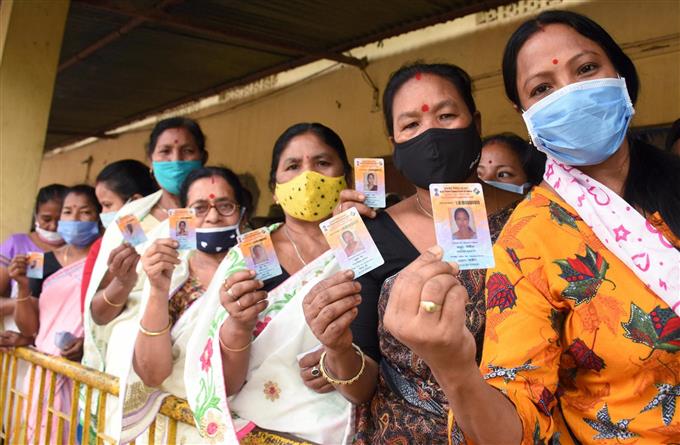
Assam Accord delayed, outfit plans mini census of ‘indigenous Muslims’

An influential organization, the Janagosthiya Samannay Parishad, is planning to conduct a mini census of the Muslim population in Assam to identify the indigenous Muslims. The move comes amid reports that the National Register of Citizens (NRC) is being updated and implementation of the crucial Clause 6 of the Assam Accord is being kept in cold storage by the present BJP-led government.
Clause 6 says: “Constitutional, legislative and administrative safeguards, as may be appropriate, shall be provided to protect, preserve and promote the cultural, social, linguistic identity and heritage of the Assamese people.”
According to the 2011 census, the Muslim population in Assam was 34.22 per cent — in numbers, it comes to over 1.4 crore. The Parishad plans its drive among around 40 lakh indigenous Muslims across the state. The JSP, which claims to represent three categories of indigenous Muslims — Goriya, Moriya and Deshi – says indigenous Muslims are facing a major identity crisis because of the Bengal-origin migrant Muslims.
This comes in the backdrop of the Gauhati High Court ruling that a person can’t be declared a foreigner just because he could not establish his linkage with all his relatives on the voter list, and possession of properties pre-1971 could be seen as corroborating evidence that the petitioner is a descendant of people who were already living in Assam before 1971.
Also read: 2.77 lakh ineligible names may have been included in Assam NRC, HC told
The ruling came on a petition filed by Haider Ali who came from Barpeta district in Assam and challenged the Barpeta Foreigners Tribunal ruling declaring him a foreigner on January 30, 2019, for having failed to prove his linkage with his relatives on the voter list.
The Gauhati High Court ruling said: “Ali, 33, had established his linkage with his grandfather and father, both of whom featured on the voter lists of 1965 and 1970 and owned properties in Assam before 1971, documents whose admissibility was not rebutted by the tribunal.”
Sabita Devi, a lawyer who is associated with the Guwahati-based non-profit organization Centre for Environment, Social and Policy Research (CESPR) said the ruling could be considered landmark as it would result in bringing relief for many who are battling similar cases at the Foreigner Tribunals to prove their citizenship.
Devi says in the Ali case, the court examined all aspects, often overlooked by the tribunals, and upheld the constitutional right of the citizen.
Speaking to The Federal, Mominul Aowal, JSP convener and chairperson of the Assam Minorities Development Board, said the indigenous Muslims have an identity different from the Bengal-origin Muslim migrants and said that there was an attempt to merge the two, terming it unacceptable.
“In 2018-19, the Assam government had allotted ₹ 100 crore for the welfare of indigenous Muslims, but no one knew how the amount was spent. The Assam government had also promised a census of the indigenous Assamese Muslims. “Once this census is completed, we’ll have solid data which will be beneficial for the Assamese Muslims,” said Aowal, adding it will be helpful once Clause 6 of the Assam Accord is implemented.
He said the state government had also announced several development projects for the indigenous Assamese Muslims, but those have never been implemented.
Also read: BJP promises ‘corrected NRC,’ quick delimitation process in Assam
Aowal said the JSP exercise would be done using digital means. The Parishad has created a portal with a three-month window (from April 15) to submit all relevant documents given by the organization and competent government authority. “We’ll complete the entire exercise within a year and publish it,” Aowal said, adding there will be scope for rectification.
Explaining the distinct identity of the indigenous Muslims, he said the Goriyas converted from various indigenous groups and tribes across Assam, whereas the Moriyas’ ancestors were brought by the Ahom kings to make weapons and utensils and were settled in various parts of the state, and the Deshi converted specifically from the Koch-Rajbongshi community.
“The Assamese-speaking Muslims qualify to be termed indigenous under the UN definition and we plan to push for that,” he added.
The Assam government had last year announced a survey to identify the indigenous Muslim population of the state. It also included the socio-economic census of indigenous Muslims, but it didn’t proceed beyond the announcement.
However, a section of the indigenous Assamese community disagreed with the initiative, saying post this exercise, Assamese Muslims will simply become “non-Miya Muslims.”
“It is important to define who Assamese Muslims are, and find out their numbers, but this exercise will end up underlining their Muslim identity rather than their Assamese identity. The people behind it believe that it will distinguish Assamese-speaking Muslims from Miya Muslims. They appear blind to the fact that this will reduce their identity to a subset of Muslims,” said Kabir Firaque, an Assamese Muslim journalist based in Delhi.
“Why not a census of all Assamese groups — Ahom, Koch, Sutia, Goriya/Moriya, various caste Hindus and various tribes? Such an exercise would identify Assamese Muslims as a subset,” said Kabir Firaque.


